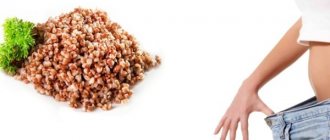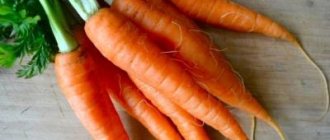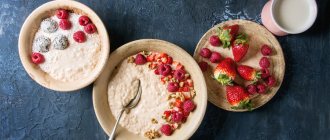The question of whether it is possible to eat buckwheat at night is primarily of interest to those who are losing weight or seeking to maintain the achieved results after losing weight. Buckwheat is a popular and affordable source of nutrients, but is it worth eating it on a diet, especially in the evening and at night? From this material you will learn about the properties of buckwheat and recommendations for its use not only in the process of losing excess weight, but also during intense training to gain muscle mass.
Diets and other ways to combat excess weight are very popular, because being slim is not only beauty, but also health. Obesity makes life difficult, prevents you from being active and creates psychological difficulties, but that's not all. Against this background, a huge number of concomitant diseases develop, such as diabetes, hypertension, atherosclerosis and many others. Therefore, the desire to lose weight and stay in shape is directly related to the quality and length of life.
When losing weight, nutrition becomes the main measure; exercise is also very useful, but it only enhances the results of a properly chosen diet. People understand this, so they have a lot of questions: what to eat on a diet, what you can eat and what you can’t. Particular attention is paid to evening meals. The work of all body systems is subject to circadian rhythms, therefore, at different times of the day, digestive and metabolic processes proceed differently. As night approaches, they slow down, which increases the risk of converting energy obtained from food into fat reserves. Part of the reason is that the main consumer of energy is the muscles; at night they do not work, but are at rest. Absorbed carbohydrates are broken down into glucose; the body cannot use it for activity, so it stores it in reserve.
Excess weight is not the only consequence of late dinner. The digestive system produces enzymes to break down and absorb nutrients from foods. At night, they can accumulate, which indirectly leads to the development of diabetes and the formation of gallstones. But that’s not all, the habit of overeating at night reduces the quality of rest, causes insomnia or makes sleep intermittent and not deep. As a result, the next day the person feels tired. If the situation is regularly repeated, it affects beauty, primarily the condition of the hair, elasticity and skin color. Insomnia, like obesity, entails associated diseases.
However, this does not mean that you cannot eat after six in the evening or other time. You should not go to bed in hunger pangs; this will also cause problems with sleep. It is recommended not to have large meals three hours before bedtime; during this same period you should be extremely attentive to the choice of foods. Let's figure out whether buckwheat is suitable for an evening snack.
How is buckwheat useful?
Krupa was named this way because Greece was considered its homeland for a long time. However, this is not true. Modern researchers believe that it was first grown and eaten in the Himalayas. Buckwheat is so common because it suits almost everyone. It can be included in baby food starting from six months; compared to other cereals, it extremely rarely causes allergies. It contains few simple sugars, so nutritionists usually do not prohibit its use during weight loss. In moderation, it is appropriate even in a diabetic diet.
Buckwheat is nutritious; there are about 110 calories per 100 grams. The composition contains vitamins E and group B, a lot of fiber for satiety and slow down the absorption of carbohydrates. It will also be useful for the prevention of diseases of the cardiovascular system, as it has the properties to improve blood composition and have a positive effect on the walls of blood vessels. For those who play sports, a significant characteristic is not only nutritional value, but also the high protein content, which is so necessary during physical activity.
Slow-acting carbohydrates and fiber slow down the absorption of sugar into the blood, which prevents sudden spikes in blood sugar levels. A person feels full for a long time; many cereals have this effect. The duration of satiety does not depend on the calorie content of the food; for example, sweets contain a lot of calories, but after eating them people immediately feel hungry again.
The positive properties of buckwheat can make you believe that it is safe to eat at any time of the day. But this is not so; eating buckwheat at night is categorically not recommended, especially during the period of losing excess weight and if you are prone to its reappearance. Slow-release carbohydrates are still carbohydrates, and when consumed during the day they keep you full, but at night your metabolism slows down and they lead to the appearance of fat deposits.
Thus, buckwheat is useful, like most natural products, but not when consumed at night. You can and should eat it during the day, but before doing so, you should familiarize yourself with the recommendations of experts in the field of nutrition and health.
Chemical composition and nutritional value of buckwheat
100 g of cereal contains 75 g of carbohydrates . And this is approximately 81% of the total energy from the serving or 300 kcal. The calorie content of the product is 346 kcal.
Composition of buckwheat:
- proteins – 11.73 g – 15.6%;
- fats – 2.71 g – 3.2%;
- carbohydrates – 74.95 g – 24.2%;
- water – 8.41 g.
Buckwheat does not contain fat-soluble vitamins . Among the water-soluble vitamins you can find B vitamins (1, 2, 3, 4, 5, 6 and 9):
- B1 – 18.7%;
- B2 – 20.8%;
- B3 – 32.1%;
- B4 – 10.8%;
- B5 – 24.7%;
- B6 – 27.2%;
- B9 – 10.5%.
As for micro- and macroelements, the product also contains a lot of them:
- magnesium – 230 mg;
- calcium – 18 mg;
- potassium – 460 mg;
- zinc – 2.4 mg;
- selenium – 8.2 mg;
- phosphorus – 347 mg;
- iron – 2.2 mg;
- copper - 1.1 mg;
- manganese – 1.4 mg.
Buckwheat has an average glycemic index - the indicator varies between 55-60 units. It is recommended to include it in the diet of people with diabetes.
How to eat buckwheat?
Despite the fact that eating buckwheat porridge at night leads to excess weight, it can be very useful for getting rid of it. This is not about the buckwheat diet, although this technique is in demand, it has nothing to do with healthy weight loss. Buckwheat is a popular component for mono-diets, as it has a rich taste, which allows it to withstand restrictions on other food products. It must be admitted that a mono-diet on buckwheat is not as dangerous as on apples, but you still shouldn’t resort to it. The diet cannot consist of one or two products; it must be balanced so that the body receives as many useful substances as possible. Even a short period of strict restrictions does not leave its mark on health. In addition, the weight lost on such diets always comes back.
For buckwheat to help you lose weight, you need to properly combine it with other food ingredients. The optimal complement would be boiled or steamed white meat chicken or beef. Buckwheat also goes well with milk, kefir and other fermented milk products. To enhance the taste, it is better to use not salt and sugar, but a small amount of soy sauce, fruit or dried fruit. Do not forget about the drinking regime; while losing weight, the body’s need for fluid increases. On average, it is recommended to drink at least two liters of still water per day.
From cereals you can make not only porridge, but also cutlets and pancakes; this is a great way to diversify your diet. But regardless of the choice of dish, you can’t eat buckwheat alone; you shouldn’t eat it in the evening either. We will talk about preferred foods for dinner later.
To preserve the benefits of buckwheat and get a tasty dish, you need to learn how to cook it correctly. You can not cook this cereal, but steam it with boiling water and then infuse it; this method of cooking is healthier. To preserve even more nutrients, you need to pour cold water over the grains in the evening and leave them at room temperature overnight. In the morning, you can reheat the porridge, its taste will be the same as after cooking. For one part of cereal, take two parts of water. It is better to add kefir and milk to the finished porridge.
You need to be extremely careful with seasonings. Unlike sugar, spices are not high in calories or carbohydrates, but many of them can increase appetite, dulling the feeling of fullness. To enhance the effectiveness of the diet, physical activity is necessary. Buckwheat will also be useful in sports nutrition.
Buckwheat for dinner at pp. Buckwheat porridge with mushrooms for dinner.
(Buckwheat has a low glycemic index, making it ideal for dinner).
Ingredients:
- Buckwheat - 1 cup.
- Water - 2 cups.
- Champignons - 400 g.
- Onion - 1 pc.
- Parsley - 1 bunch.
- Olive oil - 2 tbsp. l.
- Salt to taste.
- Preparation:
1. Prepare the ingredients.
2. First, cook the buckwheat. The ratio of 2 cups of water to 1 cup of cereal is perfect. Pour buckwheat into boiling salted water and reduce heat. An important point: do not stir the cereal poured into the water until the end of cooking. 3. Cook until the water has completely boiled away. You can check how much water has boiled away with a knife: move the porridge a little and look at the bottom. Only if the water has completely boiled away, turn off the heat and cover the finished porridge with a lid. 4. While the porridge is cooking, chop the mushrooms and onions. 5. Fry the onion in a small amount of oil (preferably olive) until the onion is slightly browned. 6. Add mushrooms and continue frying for about 5-7 minutes. 7. Finely chop the parsley. 8. Add mushrooms and parsley to the buckwheat and mix everything carefully. Bon appetit!
Use in sports nutrition
The rich composition of buckwheat has made it an indispensable product for a sports diet. It is especially highly valued in bodybuilding and other sports disciplines, where nutrition is necessary to gain muscle mass and maintain existing muscles. You can eat this porridge both before visiting the gym and after training, but you need to know the optimal time to take it.
Rational use provides the athlete with the following benefits:
- strengthening the muscular system, muscle growth;
- saturation with proteins, slow carbohydrates, dietary fiber and mineral components;
- acceleration of metabolism, prevention of excess weight;
- reducing blood glucose and cholesterol levels, high blood pressure;
- long lasting feeling of fullness, slow and stable energy;
- increased endurance during intense physical activity;
- removing excess fluid from tissues to get rid of edema.
Before training
Before physical activity, it is necessary to replenish the body's energy reserves. Carbohydrates are necessary for this as they are used by the body as the main source of energy. Buckwheat is suitable for this task; it contains many carbohydrates and can provide an energy boost before a workout. Porridge should account for at least 60% of the total calorie content of the pre-workout meal, the remaining 40% should come from protein. Depending on the ease of absorption of the protein component, the meal should take place 1-2 hours before class. Meat products take longer to digest than other protein sources.
This is true both for strength training aimed at gaining muscle mass, and for exercise for the purpose of losing weight. This range promotes better absorption of creatine, which is often used in pre-workout supplements.
Following these principles will allow you to achieve:
- preparing the body for upcoming physical activity;
- maintaining a stable energy level;
- protection against overvoltage and chronic fatigue;
- supporting physical endurance and productivity.
If you do not eat enough food before training or do not pay attention to its composition and time of consumption, then the energy received will not be enough for a full workout. Energy reserves will run out sooner than expected, fatigue and hunger will appear. At the same time, you should also not overeat before exercise; more does not mean better. The size of your pre-workout meal should be the same as any other meal. The stomach is accustomed to digesting a certain volume, exceeding which will lead to problems such as indigestion, drowsiness, loss of energy, and dizziness.
It is important to wait 1-2 hours before training, as exercise slows down the absorption of food. At the start of training, digestion in the stomach should be completed. It has been scientifically proven that regular consumption of buckwheat helps to achieve psycho-emotional harmony, so you can count not only on the benefits for the body, but also on a good mood.
After training
Athletes' views on the timing of meals before training are similar; with meals after training, everything is not so clear. Opinions differ, everyone chooses what suits him best. Some people eat post-workout amounts during the so-called carbohydrate window. It is believed that it lasts from 15 minutes to an hour after the end of the workout, during this period it is necessary to take carbohydrates to restore energy levels and proteins necessary for muscle tissue. Supporters of other views do not recommend eating earlier than 2-3 hours after the end of the training. For the first couple of hours, they only drink water because they don’t want to put a strain on their digestion.
There is also no consensus on the choice of products. Many athletes insist that immediately after exercise, the body primarily needs carbohydrates. They replenish energy reserves with buckwheat or any other high-carbohydrate product with a small addition of protein, and protein loading is carried out after some time. There are also many supporters of another strategy: take protein as quickly as possible in order to start the processes of muscle tissue restoration and create conditions for its growth, and only then load the body with carbohydrates. There is a third opinion; its supporters insist on an even combination of protein and carbohydrate components.
The choice of regimen depends on the type of training and the individual characteristics of the athlete, especially on the speed of metabolic processes. In any of them there is a place for buckwheat, since despite the predominantly protein composition, it also contains vegetable proteins. However, protein of plant origin does not have a complete amino acid composition. To get all the necessary amino acids, you need to combine buckwheat with other foods.
How much to eat to gain weight?
The daily diet may contain 1-2 buckwheat dishes per day. The serving size varies, depending on the body's needs and energy expenditure. Professional athletes can plan their diet on their own; beginners turn to a coach or nutritionist for help. On average, to gain muscle mass you need to consume 3 grams of carbohydrates, 2 grams of protein and 0.5 grams of fat per kilogram of body weight every day.
Buckwheat cannot be the only source of carbohydrates and vegetable proteins. For health and athletic development, it is important to eat a varied diet. If nutrition plays a more important role in relation to training when it comes to losing weight, then when it comes to gaining muscle mass they are equally important. You won’t be able to build muscle without a well-designed training program.
Is it even possible to eat at night?
If such a healthy and safe product as buckwheat cannot be eaten at night, then what can you eat? Maybe you should completely give up eating at late times of the day? To understand this issue, you need to understand how the human body works and how digestion works.
During night sleep, life support systems continue to function. We breathe, the lungs continue to saturate the blood with oxygen, the blood supply system transports it throughout the body, the endocrine system produces hormones, and dozens of other important processes are carried out. Energy is required to carry out these processes.
Our task is to provide the body with this energy at night, but not to allow its excess, since unclaimed energy is converted into fat deposits.
The gastrointestinal tract does not function as actively during sleep as during the daytime, but it does not stop working completely. Therefore, there is nothing wrong with eating a small meal in the evening hours. On the contrary, you should not go to bed hungry; this will provoke a number of problems related to metabolic processes, digestion, sleep disorders, headaches, as well as bad mood and other emotional disorders.
You should not eat excessively high-calorie and voluminous food for dinner, since in the evening the activity of digestion decreases and metabolic processes slow down. If you overeat in the evening, the food will not have time to be digested before going to bed; this is a common cause of obesity, deterioration in well-being, and the development and exacerbation of gastrointestinal diseases.
The body spends the greatest amount of energy on digesting protein foods, carbohydrates come in second place, and the least amount of energy is required on the absorption of fats. It follows that to lose weight in the evenings, you need to limit your intake of fats and carbohydrates, focusing on proteins. But protein foods should also be consumed in moderation.
Late dinner
Excess weight causes many diseases, the most dangerous of which are hypertension, diabetes, and atherosclerosis. Diets and the fight against excess weight have become increasingly popular in recent years, and the buckwheat diet, as one of the most effective, has many supporters. However, even among them, debates flare up on the topic: is it possible to eat buckwheat at night and when should the last meal before bed be.
The human body functions depending on the time of day and by night the processes responsible for the digestive system slow down. Even a light snack before bed can add extra pounds. This happens because the muscles involved in the process of processing and promoting glucose are relaxed at night and cannot fully perform their work. And unbroken glucose, entering the liver, leads to rapid deposition of adipose tissue.
Eating dinner before bed can also have other complications. Enzymes necessary for the breakdown of carbohydrates, proteins and fats accumulate in the body at night. Their lack during the day can give rise to the development of diabetes mellitus, and the bile secreted by the gallbladder can trigger the formation of gallstones. Snacking before bed will also lead to insomnia, weakness and fatigue in the morning.
Importance of mode
During a diet, regimen plays a big role. Buckwheat is gradually absorbed by the body and dulls the feeling of hunger for a long time, but at the same time, the first days of the diet can be difficult from a psychological point of view. The need for snacks and large portions remains at the subconscious level. Therefore, it is important to distribute your day so that meals are at regular intervals. It is also important to go to bed no later than 11 pm.
If you follow a constant regimen, the body will get used to the time of eating and the feeling of hunger will no longer bother you. To make it easier to adapt to the new schedule, nutritionists allow you to eat a little low-fat cottage cheese or yogurt in the evenings after dinner, or drink a glass of 1% kefir.
If not buckwheat, then what?
No matter how much we love buckwheat, we shouldn’t eat it at night. But what then can you afford for dinner or a snack before bed? The evening meal should provide sufficient energy and create conditions for sleep and rest. The following products meet these requirements.
Vegetables
Any non-starchy vegetables, raw or cooked, will do. Preference should be given to gentle cooking methods: boiling, stewing, baking without oil, steaming. One of the most important components of a healthy diet, vegetables are ideal for a late-night snack. In addition, they can be used to prepare many healthy dishes: salad, stew, baked or grilled vegetables. Their advantages include low calorie content, normalization of intestinal microflora and the functioning of the entire gastrointestinal tract, cleansing the body and strengthening the immune system.
Bell peppers, cabbage, cucumbers, celery, tomatoes and greens can be consumed in any quantity and combination. In the case of pumpkin, carrots and beets, you need to build on the permissible calorie content. You should not eat legumes at night; they are appropriate in a healthy diet, but they are difficult for digestion, so their consumption should be moderate and occur at earlier hours.
Dairy products
Greek yogurt, kefir, yogurt, fermented baked milk make us full, but at the same time contain an average of 50-70 calories per 100 grams, and are also very easily and quickly digested. We are talking about natural fermented milk products without sweeteners and other additives. Whole dairy products are healthier and more satisfying than low-fat ones, but they are higher in calories, this must be taken into account.
From these light drinks, the body receives the protein it needs, as well as a portion of calcium. After such a snack there will be no heaviness in the stomach and problems with sleep. The live bacteria they contain have a positive effect on the intestinal flora, reduce the acidity of gastric juice, soothe and relax digestion. This is exactly what you need in the evening.
Poultry meat
Chicken breast or turkey fillets contain only 90-110 calories per 100 grams. This is one of the best sources of protein. For dinner, you can eat boiled, baked or stewed fillet, complementing it with vegetable stew as a side dish or a salad of fresh vegetables. After such a meal, hunger will definitely not wake up until the morning.
However, chicken and turkey have a drawback: they often cause allergies. An alternative for allergy sufferers can be rabbit meat. This lean dietary meat contains about 150 calories per 100 grams.
White fish
Low-fat varieties of white fish are also quite suitable for dinner. To fill up, a 100-gram serving with vegetable salad as an addition will be enough. It is better to cook fish steamed or grilled. With this processing, the energy value will not exceed 100-150 kcal. You can also bake fish in the oven along with vegetables. White varieties have little fat, but a lot of protein, phosphorus and calcium are present. They are quickly absorbed and help reduce the level of bad cholesterol in the blood. There are many suitable varieties: pollock, pike, trout, saury, pike perch, hake, cod.
Cottage cheese
It will be an excellent option for a late snack. To do this, you need to choose medium fat content; high-fat cottage cheese has a lot of calories, and low-fat cottage cheese is difficult to eat. It is worth choosing cottage cheese without additives; to diversify the taste, you can add a little greenery. It is better to avoid such traditional additives to cottage cheese as raisins or other dried fruits in the evening, they contain too many carbohydrates.
Eggs
Egg white is considered the most valuable of all known to mankind. It contains all the essential amino acids, and the yolk contains healthy fatty acids and vitamins. Eggs are easily digested, but it takes about two hours, which is important to consider. One egg contains only 70-80 calories, so a two-egg omelet with the addition of vegetables becomes a balanced and satisfying, yet light dinner. On a low-calorie diet, only the white without the yolk is often used for cooking.
Seafood
Seafood is valued for its high protein content and composition rich in useful elements with low calorie content. They will be complemented by a salad of any non-starchy vegetables or the same vegetables stewed. Any seafood can be combined with greens; the more greens, the tastier and healthier it is.
Fruits and berries
Some fruits contain too much sugar to be a late meal or even an addition to it. However, some will work perfectly for this purpose, as long as the quantity is controlled. First of all, these are citrus fruits, unsweetened varieties of apples and pears. They contain a lot of fiber, which makes you feel full. The same can be said about almost all berries; they contain even more antioxidants and vitamins than fruits. If you take unsweetened varieties, then a glass serving will contain no more than 100 calories. Bananas and grapes are strictly prohibited; they contain too many light carbohydrates. It is advisable to supplement the fruit with something protein, then the meal will become balanced.
Mushrooms
Of course, these are not fried mushrooms with potatoes or baked in rich sour cream. A dietary dinner for 100-150 calories can be mushrooms, grilled, stewed or prepared as a puree soup with water. In terms of the amount of protein, they cannot be compared with meat or cottage cheese, but they are leaders in this indicator among products of plant origin.
A negative answer to the question whether you can eat buckwheat at night is not upsetting when there are so many healthy and tasty alternatives. However, even with the most dietary products, one should not forget about moderation. The main meal should not be more than 200 grams and 200 calories, a snack should be half as much. If you follow these rules, the likelihood of gaining excess weight and experiencing insomnia will be significantly reduced.
What is the buckwheat diet?
The buckwheat diet for weight loss is a type of mono diet, in which you are allowed to eat a strictly limited set of foods.
Proponents of this weight loss method claim that it is quite simple to adhere to it, since the menu is prepared in advance and there is no craving for “forbidden” foods. Buckwheat has a low calorie content, but is rich in nutrients, vitamins, and minerals. It contains magnesium, calcium, iron, B vitamins, iodine. It also contains large amounts of plant protein.
Reviews from those who have lost weight indicate that such a diet can fully enrich the body with essential nutrients. But doctors cannot agree with such an unequivocal statement. The buckwheat porridge diet is not suitable for everyone; it has a fairly wide list of contraindications and restrictions. A poor diet can lead to breakdowns, depressive disorders, eating disorders, and cause serious illnesses. It will be possible to lose weight by a certain number of kilograms, but maintaining the results will not be easy.










